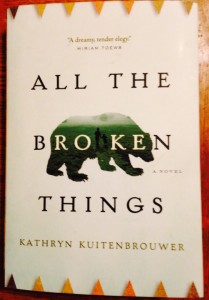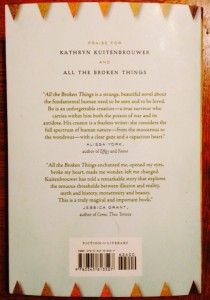Monday Feb 10 Update: Wow, I loved All the Broken Things, Kathryn Kuitenbrouwer’s exquisite novel. Such a rich story of an orphaned boy, his sister, and the carny world of bears and barkers that both assaults them and supports them. They weather all that is arrayed against them. I give this extraordinary novel my highest personal recommendation.
—
 #FridayReads, Feb 7–Kathryn Kuitenbrouwer’s novel All the Broken Things. This is an amazing and compelling novel set in Toronto in the early 1980s, about a Vietnamese immigrant family of three, former boat people–mother Rose, teenage son Bo, 4-year old daughter Orange Blossom, known as Orange, who was born with profound birth defects owing to Rose’s exposure to the Agent Orange that the US used to defoliate the countryside during the war. The killing chemical was manufactured in Ontario, a factual point that Kuitenbrouwer makes in an Author’s Note. I’ve found the writing in this so good, the sheer sentence-making and storytelling, that though I had read terrific reviews of the novel, prompting me to to order a copy, when it arrived I was expecting to only glance at the opening page and then put it aside until a moment when I thought I would have more time for it. Suffice to say, I didn’t put it aside at all, and now a day later, I’m on page 134. The book is commanding my attention, drawing me in, like the wrestling bear does Bo, the teenage boy of the tale, who willingly folds himself into the animal’s embrace.
#FridayReads, Feb 7–Kathryn Kuitenbrouwer’s novel All the Broken Things. This is an amazing and compelling novel set in Toronto in the early 1980s, about a Vietnamese immigrant family of three, former boat people–mother Rose, teenage son Bo, 4-year old daughter Orange Blossom, known as Orange, who was born with profound birth defects owing to Rose’s exposure to the Agent Orange that the US used to defoliate the countryside during the war. The killing chemical was manufactured in Ontario, a factual point that Kuitenbrouwer makes in an Author’s Note. I’ve found the writing in this so good, the sheer sentence-making and storytelling, that though I had read terrific reviews of the novel, prompting me to to order a copy, when it arrived I was expecting to only glance at the opening page and then put it aside until a moment when I thought I would have more time for it. Suffice to say, I didn’t put it aside at all, and now a day later, I’m on page 134. The book is commanding my attention, drawing me in, like the wrestling bear does Bo, the teenage boy of the tale, who willingly folds himself into the animal’s embrace.
Bo is the is fulcrum of the tale. He, far better than Rose, is able to handle Orange and comfort her. But he’s having a very hard time in middle school, picked on by a kid who yells ethnic slurs at him and wants to fight. Bo obliges this kid, and acquits himself well in their after-school battles. One of these scrums is observed by a carnival promoter who thinks Bo may be able to help out in his sideshow that features a bear, Loralei, who is trained to wrestle people. The Author’s Note also make the point that bear wrestling was at one time legal in Ontario, even common on the carny circuit. Just as Bo has an uncommonly intuitive way with his sister, he also has a gift with bears. Kuitenbrouwer’s descriptions of the tactile and empathic relationship between boy and bear could be outlandish, but instead are wholly believable. This is the book’s first paragraph:
“1984, BEAR
Look at the bear licking Bo’s toes up through the metal slats on the back porch. Bo is fourteen years old, and the bear not a year. The bear is named Bear. When the boy spreads his toes as wide as he can, Bear’s mottled tongue nudges in between them and this tickles. Bear craves the vanilla soft ice cream that drips down Bo’s cone and onto his feet. Bo imagines it must be glorious for Bear to huddle under the porch–her favourite spot–and lap and lick up the sweet cold treat. He imagines himself tucked in down there pretending to be a bear, and then how wonderful it might be, after a day alone, to have someone drip vanilla ice cream right into this mouth.”
From Robertson Davies’ Fifth Business to Ellen Hunnicutt’s Suite for Calliope: A Novel of Music and the Circus, a book I edited and published, to W.C. Fields’ 1939 film “You Can’t Cheat an Honest Man,” I have long had an affinity for carny stories, and All the Broken Things belongs in that good company. I want to know what happens next for Bo and his fragile family, and will be spending much of the next few days finding out. Writer Jonathan Bennet has also discovered the charms of this book, in a great appreciation here.
[Cross-posted on my blog The Great Gray Bridge]




